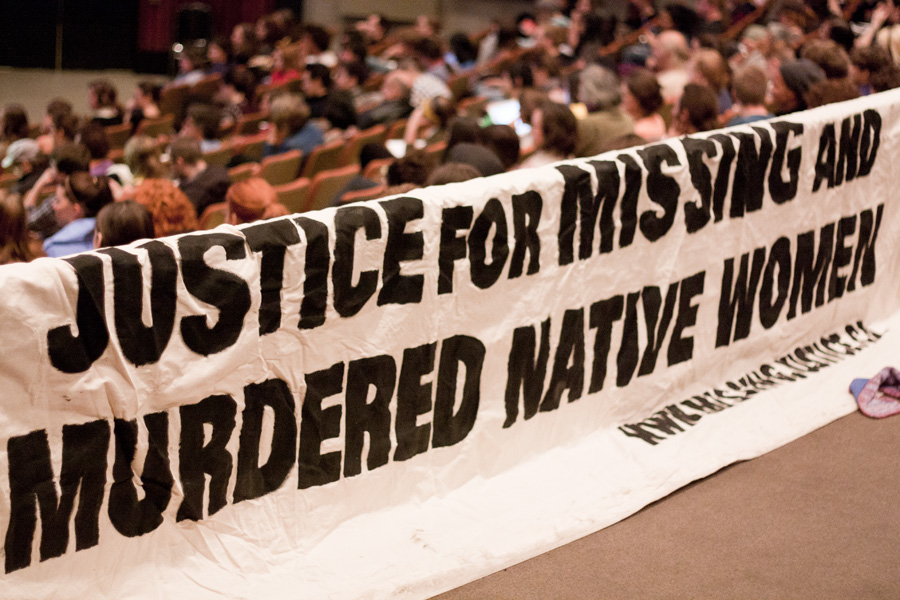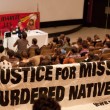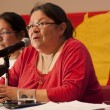Tears and laughter found their space in a discussion titled “Defending the Land: Indigenous Women’s resistance to Plan Nord and community violence.” The event, held last Friday, was hosted by Concordia University’s Centre for Gender Advocacy’s Missing Justice campaign.
Plan Nord is the provincial government’s plan to develop northern regions of the province. It involves exploring the largely untapped resources of northern Quebec, according to the Quebec government’s website.
“The North’s mining potential affords us an opportunity to capitalize on the development of the emerging countries by ensuring the responsible development of the territory’s resources,” reads a message from former Quebec Premier Jean Charest on the government website.
Friday evening’s event gave three Aboriginal women the chance to speak out and educate the Montreal community about what is happening in Northern Quebec from their perspective.
Monica van Schaik, one of the event’s organizers, said she helped to plan the discussion because she is concerned that Plan Nord is not something that the citizens of Montreal know enough about.
“I just think it’s something that just wasn’t being talked about enough [and] wasn’t being talked about in our schools in Montreal,” von Schaik said. “We decided to plan this event because it’s happening here, and it’s our own government, and it’s just something we wanted to raise awareness about.”
Ellen Gabriel, a human rights advocate and former president of the Quebec Native Women’s Association, discussed how Plan Nord and mining activity affect Aboriginal women in particular.
“Mining companies come in and look at Aboriginal women as if they can violate them,” Gabriel said. “It has to stop. Mining activity is probably one of the worst personal abusers of human rights.”
Gabriel added that violence against Aboriginal women occurs five times more than it does against any other group of women.
The other two speakers were Élyse Vollant and Denise Jourdain. Both women walked from Sept-Iles to Montreal for Earth Day earlier this year, according to van Schaik.
Vollant—an Innushkueu from the North Shore community of Uashat mak Maliotenam—was one of 12 women who were arrested after participating in a blockade on route 138 in protest of Plan Nord last March. At the event, she discussed her personal struggle against Plan Nord.
“After the blockade, I was imprisoned,” Vollant said in French. “There were accusations that I had destroyed the territory. It was Hydro-Québec that destroyed the community.”
Her main concern was for the children of the northern communities.
“Today, what we are trying to do is for the future generation,” Vollant said. “The march was really for the children.”
Jourdain, who spoke next, is a member and community organizer of the Innushkueu community of Uashat mak Mani-utenam, and was also arrested following the blockade. The activist said that she has been participating in blockades and demonstrations since she was 13 years old.
Jourdain spoke of the land she remembers from when she was a child, and how it is now under threat from the Quebec government. She also spoke out against the Quebec government’s offer of $80 million to Indigenous communities as compensation. The compensation is being destroyed for approximately $1.25 a day per person.
“This money means nothing to us,” Jourdain said. “Quebec and the federal government do not respect our Indigenous rights.”
Jourdain concluded her discussion in tears.
“There is no law that will require the government to repair the damage they do to mother Earth,” Jourdain said.
A handful McGill students attended the event, including SSMU VP External Robin Reid-Fraser. She explained that she was not at the event to represent McGill, but out of her own person interest.
“Some Indigenous groups are kind of on board with [Plan Nord], and really that’s not the case across the board, “ she said. “So I felt like it was really important to come and hear what these other groups are saying—the ones that really do see a kind of problem with this kind of [project].”












